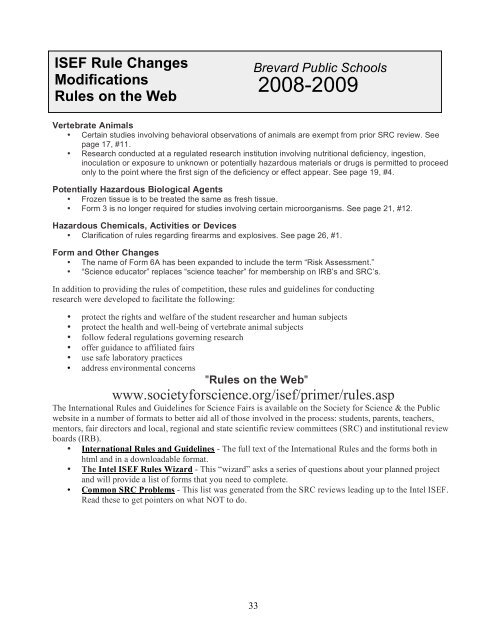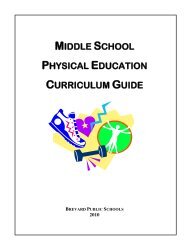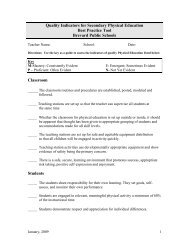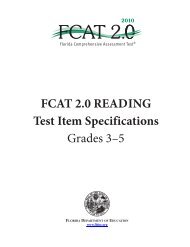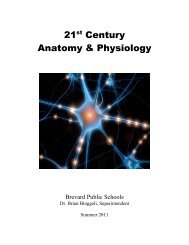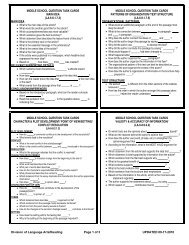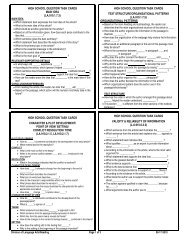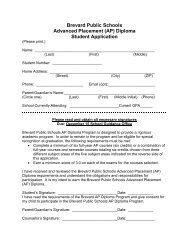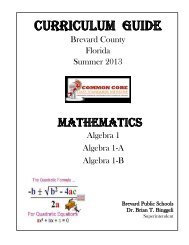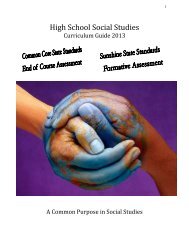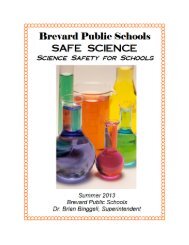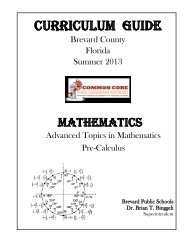Science Research Program Guide - Secondary Programs Home ...
Science Research Program Guide - Secondary Programs Home ...
Science Research Program Guide - Secondary Programs Home ...
Create successful ePaper yourself
Turn your PDF publications into a flip-book with our unique Google optimized e-Paper software.
ISEF Rule Changes<br />
Modifications<br />
The following was compiled from page 4 of ISEF <strong>Guide</strong>lines for <strong>Science</strong> and Engineering Fairs 2009<br />
Brevard Public Schools<br />
Human Subjects<br />
• Ingestion, tasting, smelling, application of a substance or exposure to any potentially hazardous<br />
Rules materials on is the an example Web of an activity containing more than minimal risk for studies involving human<br />
subjects. See page 14.<br />
Vertebrate Animals<br />
• Certain studies involving behavioral observations of animals are exempt from prior SRC review. See<br />
page 17, #11.<br />
• <strong>Research</strong> conducted at a regulated research institution involving nutritional deficiency, ingestion,<br />
inoculation or exposure to unknown or potentially hazardous materials or drugs is permitted to proceed<br />
only to the point where the first sign of the deficiency or effect appear. See page 19, #4.<br />
Potentially Hazardous Biological Agents<br />
• Frozen tissue is to be treated the same as fresh tissue.<br />
• Form 3 is no longer required for studies involving certain microorganisms. See page 21, #12.<br />
Hazardous Chemicals, Activities or Devices<br />
• Clarification of rules regarding firearms and explosives. See page 26, #1.<br />
Form and Other Changes<br />
• The name of Form 6A has been expanded to include the term “Risk Assessment.”<br />
• “<strong>Science</strong> educator” replaces “science teacher” for membership on IRB’s and SRC’s.<br />
In addition to providing the rules of competition, these rules and guidelines for conducting<br />
research were developed to facilitate the following:<br />
• protect the rights and welfare of the student researcher and human subjects<br />
• protect the health and well-being of vertebrate animal subjects<br />
• follow federal regulations governing research<br />
• offer guidance to affiliated fairs<br />
• use safe laboratory practices<br />
• address environmental concerns<br />
"Rules on the Web"<br />
www.societyforscience.org/isef/primer/rules.asp<br />
The International Rules and <strong>Guide</strong>lines for <strong>Science</strong> Fairs is available on the Society for <strong>Science</strong> & the Public<br />
website in a number of formats to better aid all of those involved in the process: students, parents, teachers,<br />
mentors, fair directors and local, regional and state scientific review committees (SRC) and institutional review<br />
boards (IRB).<br />
• International Rules and <strong>Guide</strong>lines - The full text of the International Rules and the forms both in<br />
html and in a downloadable format.<br />
• The Intel ISEF Rules Wizard - This “wizard” asks a series of questions about your planned project<br />
and will provide a list of forms that you need to complete.<br />
• Common SRC Problems - This list was generated from the SRC reviews leading up to the Intel ISEF.<br />
Read these to get pointers on what NOT to do.<br />
33<br />
2008-2009


